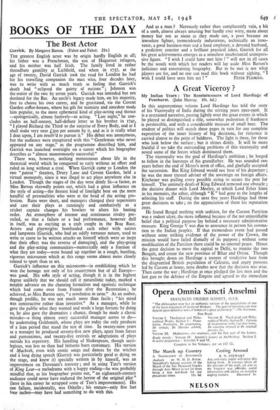A Great Viceroy ?
My Indian Years : The Reminiscences of Lord Hardinge of Penshurst. (John Murray. 10s. 6d.)
•
IN this unpretentious volume Lord Hardinge has told the story of his Viceroyalty of India during the stirring years 1910-1916. It is a restrained narrative, passing lightly over the great events in which he played so distinguished a role, somewhat pedestrian if frankness is permissible, and with a considerable measure of small beer. The student of politics will search these pages in vain for any complete exposition of the inner history of big decisions, for reticence is carried almost to the point of baldness. The light is there, for those who look below the surface ; but it shines dimly. It will be more fruitful if we take the outstanding problems of this viceroyalty and reveal some of the forces which dominated them.
The viceroyalty was the goal of Hardinge's ambition ; he longed to follow in the footsteps of his grandfather. He was sounded two years before the end of Minto'S term of office, and gleefully accepted the succession. But King Edward would not hear of his departure ; he was the most trusted adviser of the sovereign on foreign affairs. Kitchener was pulling every possible string to secure the post for himself. The untimely death of King Edward removed one obstacle ; the decisive dinner with Lord Morley, at Which Lord Esher hints in his memoirs, the other, although " K " had gone to the lengths of selecting his staff. During the next five years Hardinge had three great decisions to take ; on the appreciation of them his reputation rests.
He found Bengal seething with sedition, for the Curzon Partition was a rodent ulcer, the more inflamed because of the not unjustifiable belief that a political purpose lay behind a necessary administrative measure. King George V was due to announce in person his corona- tion to the Indian peoples. If that tremendous event had passed without some striking evidence of the power of the Crown, the mission would have failed dismally of its purpose ; without some modification of the Partition there could be no internal peace. Hence the great decision to move the capital to Delhi, to reunite the two Bengals, and create the new province of Bihar and Orissa. Though this brought down on Hardinge a torrent of vindictive hate from the disgruntled British population of Calcutta, and angry protests led by Curzon at home, none doubts now that the decision was wise. Then came the war ; Hardinge at once pledged the last man and the last gun to the defence of the Empire and agreed to the immediate despatch of three divisions to the theatre of war, Providing the only trained reserves available. During the first six months of the war 8o,000 British officers and troops, and 210,000 Indian officers and men were sent overseas ; defence was remitted to the Territorials, who arrived later, and a miscellaneous force of Gurkhas, but con- fidence was justified. Thirdly, there was the advance of the hitherto successful Mesopotamian force from Kut to Baghdad. Lord Hard- inge lays the major responsibility for this misbegotten enterprise on General Nixon ; the truth is that the Home Government brought such pressure to bear, in order to cover up the abandonment of Gallipoli, that Hardinge dared not withhold his agreement. If great- ness lies in influencing events, then Hardinge is entitled to rank with Dalhousie and Curzon as the biggest men who filled this high office.
What manner of man was he ? Of the most surprising. A diplomat by upbringing, he was entirely without reserve where he trusted. Coming to India lacking experience of administration, he held the tightest grip on every phase of the policy of the Govern- ment. An austere man, he won the passionate affection of the Indian Princes and the confidence of the Indian peoples. Truly he made the Government of India the Indian Government. Then, most sur- prising of all, having filled this glittering office, he was content to disappear into the shadows of officialdom, broken only by the tragic embassy in Paris. King Edward's judgement may stand ; in his heyday he was one of the three biggest men in the service of the































 Previous page
Previous page